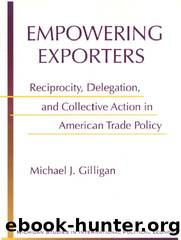Empowering Exporters by Gilligan Michael J.;

Author:Gilligan, Michael J.;
Language: eng
Format: epub
Publisher: University of Michigan Press
IX. The Uruguay Round
The latest round of GATT negotiations, the Uruguay Round, began in 1986. After seven years of often difficult negotiations (indeed, there were serious threats that the negotiations would break down completely and fail to lead to an agreement) the round was concluded successfully in December 1993. As in previous GATT agreements, the Uruguay Round agreement further reduced tariffs on manufactured goodsâin this case by one-third. However, the agreement was really a watershed in several ways. First, it included agricultural trade for the first time, reducing protection on farm products by 36 percent. Second, the agreement will eliminate quotas and replace them with tariffs that will then be progressively reducedâa dream of economists and trade negotiators in earlier rounds finally achieved. Third, the agreement included provisions to protect intellectual property, such as patents and copyrights, for the first time (Sanger 1994a, 1994b, 1994c)âalthough some firms like pharmaceutical companies, which lose billions a year in pirated drugs, believe these measures are to be phased in too slowly (Lueck 1993). Another major departure from earlier GATT rounds was the fact that the 1993 agreement created the World Trade Organization, which has an improved dispute resolution mechanismâlong a goal of U.S. negotiatorsâthat had been held up by European reluctance to create a stronger international trade organization (Sanger 3994a, 1994b, 1994c). With so many entirely new and controversial provisions it is not surprising that the Uruguay Round was the longest and most contentious to negotiate.
As in all previous GATT rounds lobbying by export companies interested in receiving greater access to foreign markets was quite significant. Indeed, exporters were politically active even while the agreement was still being negotiated in order to ensure that they gained sufficient access to foreign markets. For instance, a group of exporters composed prominently of IBM, Cargill, Caterpillar, Phillip Morris, and Hewlett-Packard kept representatives in Geneva expressly to lobby U.S. negotiators. They wanted the United States to water down an antidumping provision that was to be included in the final GATT agreement. These industries felt they would be the most likely victims of these provisions, which allow countries to place tariffs on imported goods that are sold in their countries at supposedly âless than fair value.â Of course, the other side of the issue, comprising those industries that face stiff import competition, was also represented. A group made up of auto makers like Chrysler, semiconductor manufacturers like Motorola and Intel, and consumer electronics firms like Zenith, as well as Eastman-Kodak, kept representatives at the negotiations to lobby for the beefed-up antidumping provisions (Bradsher 1993; Nomani 1993).
Other groups sent representatives to lobby for their pet issues as well. Financial services firms like American Express and Citicorp sent representatives to Geneva to (ultimately unsuccessfully) garner greater access to foreign financial service markets (Nomani 1993; Lueck 1993). McDonnell-Douglas and Boeing sent representatives to Geneva to pressure U.S. negotiators to try to win reductions of Europeâs heavy subsidies to Airbus (Lueck 1993; Nomani 1993). The American entertainment industry, particularly the Motion Picture
Download
This site does not store any files on its server. We only index and link to content provided by other sites. Please contact the content providers to delete copyright contents if any and email us, we'll remove relevant links or contents immediately.
| Accounting | Economics |
| Exports & Imports | Foreign Exchange |
| Global Marketing | Globalization |
| Islamic Banking & Finance |
The Meaning of the Library by unknow(2385)
Six Billion Shoppers by Porter Erisman(2227)
Why Nations Fail: The Origins of Power, Prosperity, and Poverty by Daron Acemoglu & James Robinson(2176)
No Time to Say Goodbye(1997)
Red Notice by Bill Browder(1927)
The Economist [T6, 22 Thg9 2017] by The Economist(1843)
Currency Trading For Dummies by Brian Dolan(1789)
Thank You for Being Late by Thomas L. Friedman(1679)
Bitcoin: The Ultimate Guide to the World of Bitcoin, Bitcoin Mining, Bitcoin Investing, Blockchain Technology, Cryptocurrency (2nd Edition) by Ikuya Takashima(1613)
Amazon FBA: Amazon FBA Blackbook: Everything You Need To Know to Start Your Amazon Business Empire (Amazon Empire, FBA Mastery) by John Fisher(1496)
Coffee: From Bean to Barista by Robert W. Thurston(1419)
The Future Is Asian by Parag Khanna(1401)
The Great Economists by Linda Yueh(1390)
Capitalism Without Capital: The Rise of the Intangible Economy by Jonathan Haskel(1341)
Pocket World in Figures 2018 by The Economist(1329)
How Money Got Free: Bitcoin and the Fight for the Future of Finance by Brian Patrick Eha(1322)
Grave New World by Stephen D. King(1315)
The Sex Business by Economist(1279)
Cultural Intelligence by David C. Thomas(1203)
